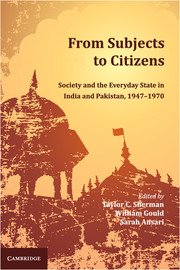Book contents
- Frontmatter
- Contents
- Acknowledgements
- Introduction
- 1 Personal Law and Citizenship in India's Transition to Independence
- 2 From Subjects to Citizens? Rationing, Refugees and the Publicity of Corruption over Independece in UP
- 3 Performing Peace: Gandhi's Assassination as a Critical Moment in the Consolidation of the Nehruvian State
- 4 Migration, Citizenship and Belonging in Hyderabad (Deccan), 1946–1956
- 5 Punjabi Refugees' Rehabilitation and the Indian State: Discourses, Denials and Dissonances
- 6 Sovereignty, Governmentality and Development in Ayub's Pakistan: The Case of Korangi Township
- 7 Everyday Expectations of the State during Pakistan's Early Years: Letters to the Editor, Dawn (Karachi), 1950–1953
- 8 Concrete ‘Progress’: Irrigation, Development and Modernity in Mid-Twentieth Century Sind
- 9 Partition Narratives: Displaced Trauma and Culpability among British Civil Servants in 1940s Punjab
- Contributors
- Index
7 - Everyday Expectations of the State during Pakistan's Early Years: Letters to the Editor, Dawn (Karachi), 1950–1953
Published online by Cambridge University Press: 05 February 2014
- Frontmatter
- Contents
- Acknowledgements
- Introduction
- 1 Personal Law and Citizenship in India's Transition to Independence
- 2 From Subjects to Citizens? Rationing, Refugees and the Publicity of Corruption over Independece in UP
- 3 Performing Peace: Gandhi's Assassination as a Critical Moment in the Consolidation of the Nehruvian State
- 4 Migration, Citizenship and Belonging in Hyderabad (Deccan), 1946–1956
- 5 Punjabi Refugees' Rehabilitation and the Indian State: Discourses, Denials and Dissonances
- 6 Sovereignty, Governmentality and Development in Ayub's Pakistan: The Case of Korangi Township
- 7 Everyday Expectations of the State during Pakistan's Early Years: Letters to the Editor, Dawn (Karachi), 1950–1953
- 8 Concrete ‘Progress’: Irrigation, Development and Modernity in Mid-Twentieth Century Sind
- 9 Partition Narratives: Displaced Trauma and Culpability among British Civil Servants in 1940s Punjab
- Contributors
- Index
Summary
Introduction
The ‘everyday state’, from the point of view of existing literature relating to Pakistan, remains very much taken-for-granted, and hence an overlooked aspect of people's lives there. The concept, which has come to be increasingly deployed by anthropologists, geographers, historians and political scientists in relation to other parts of the world, as yet remains largely unexplored from a Pakistani point of view. Focussing on the state has usually involved explaining why Pakistan came into existence in the first place—how the new state was created—and then why authoritarian trends rather than democratic political processes came to be so closely associated with it over subsequent years—why, in effect, particular interests captured control of the state apparatus. There has been relatively little concern with what the state in Pakistan at the ordinary everyday level has meant to its citizens.
The Challenge
Pakistan, like its neighbour India, faced huge challenges in making the transition from colonial rule to independence in the years following 1947. But unlike India, where the responsibilities of the post-colonial state vis-à-vis those of the people were articulated fairly swiftly and at substantial length in its 1950 constitution, it took far longer to work out the same basic political coordinates for Pakistan. It was not until 1956 that Pakistan's first constitution appeared, and even then it barely survived two years before the ‘rules of engagement’ were redrawn by the military.
- Type
- Chapter
- Information
- From Subjects to CitizensSociety and the Everyday State in India and Pakistan, 1947–1970, pp. 172 - 192Publisher: Cambridge University PressPrint publication year: 2014

